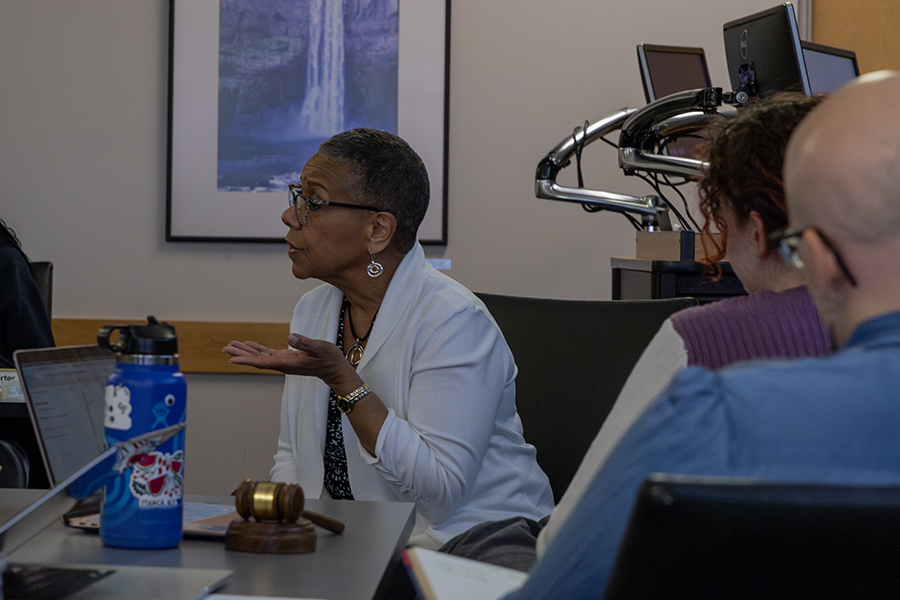The Ithaca College Student Governance Council met April 1 to pass its first bill of the Spring 2024 semester and to hear from Paula Younger, executive director for Government, Community, and Constituent Relations (GCCR).
The council readdressed the Senator Involvement Designation Bill that was first proposed in their March 4 meeting by the Campus Affairs Committee (CAC). In the meeting, the council decided that the bill needed to be amended and was tabled until the amendments were done.
Before the amendments were made, the bill required senators to join certain committees. The sections of the bill that were most amended involved senators being required to serve on committees they did not choose. The reason the bill assigned people to committees was to avoid lack of involvement, which in turn would lead to the dissolution of those committees.
The new amendments now clarify that each senator is at liberty to choose their committee assignments, however, it is suggested that they adhere to the schematic that CAC provided to ensure the longevity of the various committees within the council.
The bill was passed with 10 in favor, zero opposed and two abstaining. The two abstaining were first-year student Eva Horst, Class of 2027 senator, and sophomore Aoife Hartigan, senator-at large, because they presented the bill and could not vote on it. This is the first bill that SGC has passed during Spring 2024.
Horst said in her senator report that she was glad to see that the bill was passed since she was working on the bill with CAC.
“The first thing obviously was the Senate responsibility bill, which — yay! — had passed,” Horst said. “I was really excited about that.”
SGC also heard from Younger, who began by sharing a presentation with a brief overview of her journey into leadership positions. Younger said she is still in the process of learning more about the community on and off campus. Additionally, she elaborated on stakeholder engagement and its relevance to her role as the executive director for Government, Community, and Constituent Relations (GCCR). Younger then opened the floor to any questions the council had for her.
Younger said to the committee that she is not new to the position of executive director for GCCR at the college and that she worked in the position in 2018.
“If any of you caught the intercom announcement or maybe an article that was in The Ithacan, this is my second time around in this position,” Younger said. “I was here in 2018. Then there was [the pandemic so] I wasn’t here and then I went back, which means that I was working for two different administrations and quite frankly, a slightly different school now.”
Younger said the role of GCCR was created to help increase funding from the government for the college, but in turn, ended up involving community engagement that the government used to inform policy.
“We research at the college level [which] gets practiced at the community level, which then the government learns from that and [it] helps to inform policy,” Younger said. “And then of course, we move from the higher [education] space into the community space. Communities love to have us when you’re paying tax dollars because that tax revenue adds to the revenue base of the municipality and helps to keep things running.”
The conversation moved toward the topic of stakeholder engagement and relationship management, which Younger said is at the center of her job as executive director of GCCR. The six pillars surrounding her job based on her presentation were: campus community, local businesses and precedent development, local government, state/federal government, professional organizations and advocacy networks and the local community.
Younger said that as executive director it is important she maintains a relationship with people who reside within the aforementioned categories as she often acts as a liaison between those communities and the school.
Younger then gave an example of what she does and how it relates to the college. She said that the School of Health Sciences and Human Performance is putting in a funding application for transformational technology upgrades to some of the lab spaces and that her job would be to get letters of support from a wider community of people.
“[I have to] reach out to all of our local reps, as well as our state [representatives] to actually offer letters of support,” Younger said. “If I don’t have those relationships in place, it makes it harder for me to send out that email or pick up the phone and say, ‘Hey, could you write this letter?’ What I’m saying is if I don’t have that relationship, the turnaround takes longer.”
Younger then opened up the floor for SGC members to ask questions or provide feedback on what her office should do in the future.
Sophomore Rishabh Sen, vice president of campus affairs, asked Younger what opportunities come to mind for students to collaborate with the GCCR.
Younger said that she has ideas but would like to hear back from the council because they can provide a youthful perspective.
Senior Noah Kamens, club athlete senator, suggested that Younger hire a student worker in her office to help her gauge student opinion and give the student experience working within government.
Younger said she was considering hiring a student worker to help her with certain aspects of her job like social media, but that as of right now she is spending more time getting her office established.
The SGC is the sole representative body for the Ithaca College student community. The SGC can be contacted at [email protected].
Editors note: A previous version of this article stated the bill was passed with 10 votes in favor, zero abstaining and one opposed. The correct vote was 10 votes in favor, two abstaining and zero opposed. The article has been updated to reflect the correct vote.















